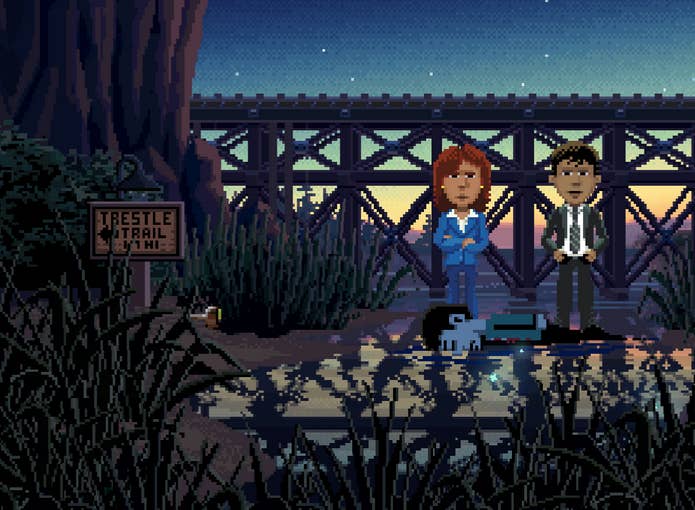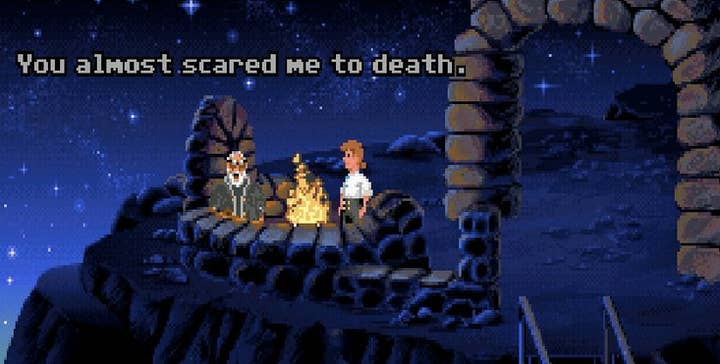Bring back the '90s: Ron Gilbert and the return of the 8-bit adventure game
"There's a desire to go back to a simpler time"
Nostalgia has become a powerful tool in entertainment these past few years.
Whether it is the return of X-Files and Twin Peaks, or Shenmue and Pokémon, bringing back classic IP has become a safe way to secure headlines and generate copious amounts of hype.
Yet it's not just brands that are tapping into our love for the familiar. Take this summer's smash Netflix show Stranger Things, which plays homage to both '80s Spielberg and classic horror. Or indeed the millions of dollars that the likes of Yooka-Laylee and Bloodstained have raised on Kickstarter - the former riffing on 1990s platformers like Banjo-Kazooie (and made by many of the same team members), with the latter acting as the spiritual successor to Castlevania (from former producer Koji Igarashi).
Ron Gilbert is another person looking to recreate those '90s feelings. The adventure game maker behind the likes of Maniac Mansion and Monkey Island is creating a new one called Thimbleweed Park, a point-and-click adventure with retro 8-bit visuals that raised $626,250 via Kickstarter.
"I think a lot of the nostalgia that is around right now comes from a desire to go back to a simpler time," suggest Gilbert, speaking to Gamesindustry.biz shortly after appearing at Melbourne International Games Week in Australia.
"Back then games were a little bit simpler and seeping with charm. A lot of people that love the 8-bit games today might not have even been alive back then, but they still identify with that era because it was so interesting and charming.
"It is really one of the reasons we did Thimbleweed Park. We were looking at and asking why was Monkey Island and Maniac Mansion so appealing? What is it about modern adventure games, although they're interesting and have great stories, that means they lack the charm those games from that era had? Can we recreate that old feeling today?"

Point-and-click adventure games are enjoying a small renaissance, thanks in part to the rise of indie developers - as indeed are platformers, Metroidvania games and a whole host of other genres long thought dead.
"I don't know exactly why adventure games faded away," Gilbert continues.
"I do feel that somewhere around the mid-90s, point-and-click adventures sort of ran off the rails. A lot of really - for want of a better word - stupid puzzles were being made. I think what happened was that people looked at this, and went: 'Wait a minute, you're asking me to do completely ridiculous and random things to get through these games.' Some players just checked out at that point.
"Somewhere around the mid-90s, point-and-click adventures sort of ran off the rails.
Ron Gilbert
"You also had games like Doom that came along and were first person and were more action orientated, and those games attracted a very different audience into games. So I don't know if adventure games necessarily fell, but they certainly didn't grow with the rest of the industry. But now we are seeing this place where we are attracting a much broader audience, and a little bit of that is due to mobile games being so ubiquitous. There are just so many more people playing games these days, and with adventure games being very story and character focused, they are able to attract that broader audience."
He continues: "You have games that have always been niche markets. Now, because of digital distribution and the way the democratisation of development tools is working, niche markets can be viable markets."
Gilbert is enjoying the current state of indie development and the ability to make decent games with relatively small teams. It speaks to his days making titles in the '80s and '90s. Maniac Mansion was made with three people, Monkey Island had five full time members of staff, which increased to seven for its sequel.

Thimbleweed Park is also being made by just a handful of creators, with input from the game's plentiful Kickstarter supporters. But this desire to go back to those early days is not just about how the visuals looked or how small the teams were, Gilbert also wants to head back to a period when developers didn't take themselves quite so seriously.
"When we were making games back then, it was all kind of new," Gilbert remembers. "We didn't have anything to go from, so it was a more innocent time. Games today, although I love modern adventure games like Firewatch or Kentucky Route Zero, they are very deep and thoughtful. They require a lot from me as a player, or the viewer, because there are very interesting, deep messages that I am gleaming from this stuff. And that's largely just the advancement of the art form. The games of the '80s and early '90s, they were just more innocent, and simple and therefore more charming.
"Adventure games have certainly improved. Visually, games like Firewatch are much more advanced. But I think they've advanced in some ways and they've actually de-evolved in others. I think they're more advanced because they are trying to tell more meaningful stories, stories that are truly about something interesting or important.
"But in other ways, they haven't moved forward. Games like Kentucky Route Zero... although I enjoyed that game quite a bit, I sort of jokingly call it the 'press A to continue game', because I didn't feel like I was making a lot of choices. I was just kind of pressing the A button to get to the next piece of dialogue, and it was greatly written dialogue and it was a captivating world, which made it ok. In Firewatch, you are spending a lot of time walking around and exploring this world, and it is a very fascinating world and a very beautiful place, so I was utterly enthralled with it, but there's not actually a lot to do. The old school adventure games really required you to work. It was a case of: 'here is a load of puzzles and here is a bunch of story, and you have to solve all these puzzles, which should lead to uncovering the next part of the mystery'. The classic adventure games were more sophisticated in that sense."
"If Disney came to me and said: 'Hey, we'll sell you Monkey Island'. I will go get the money."
Ron Gilbert
Like Yooka-Laylee with Banjo-Kazooie and Bloodstained with Castlevania, Thimbleweed Park is a game that could easily have had the words 'Maniac Mansion' or 'Monkey Island' plastered on the artwork. Gilbert does hope his new IP can be successful enough to become a series, but he also, quite publicly, wants to revisit those classic franchises that made his name. Both Maniac Mansion and Monkey Island were created at LucasArts, so the rights to them currently reside in the vaults somewhere at Disney's HQ.
Disney has largely moved on from video games, and Gilbert has asked the media giant on Twitter to let him buy back the rights to his old franchises. To no avail, so far.
We ended our conversation by asking Gilbert if he had considered returning to Kickstarter to raise the funds he might need to acquire those 1990s brands.
"Buying the rights back for those games... it's not a matter of money, it is a matter of Disney being willing to sell them," Gilbert concludes. "If Disney came to me and said: 'Hey, we'll sell you Monkey Island'. I will go get the money. No amount of crowd-funding is going to make this happen, it's just a case of Disney agreeing to sell them.
"I've not managed to talk to anyone at Disney who is high enough up the ladder to make that decision. I fear that the people who would make that decision have no idea what Monkey Island is."
